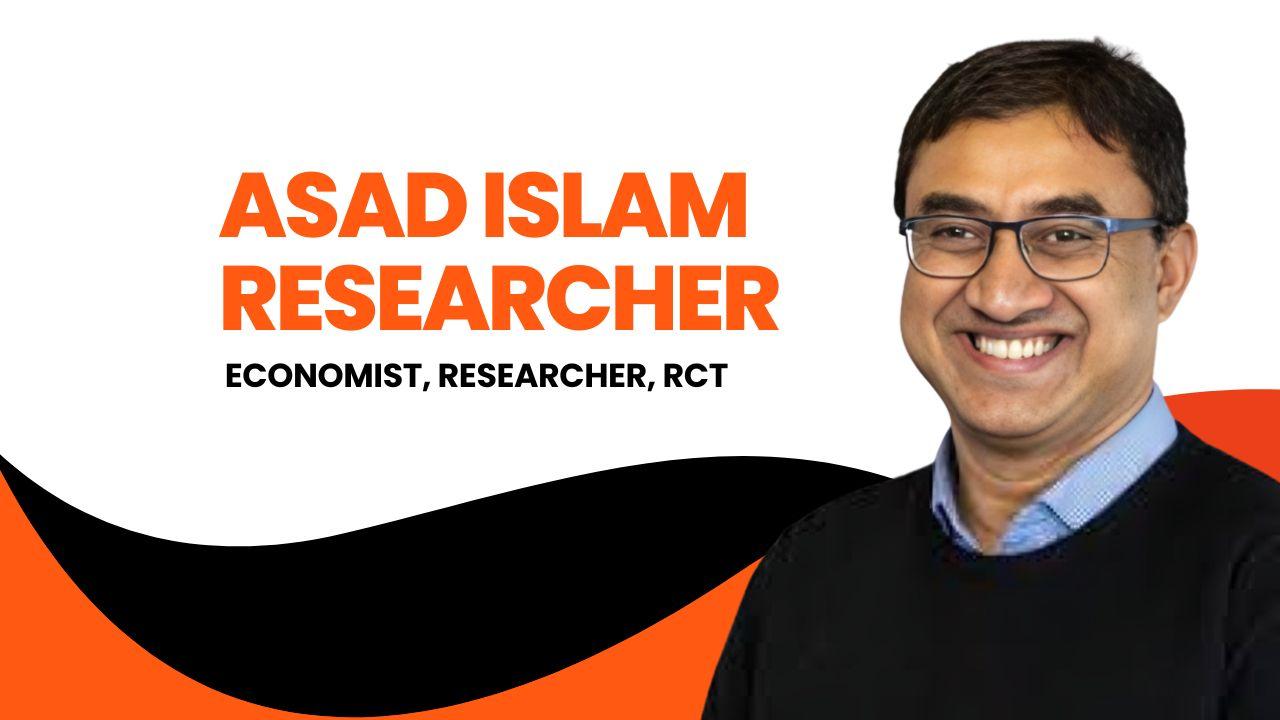Asad Islam Explains Why Behavioural Economics Matters for Environmental Sustainability

Why do people continue to make environmentally harmful choices even when they understand the consequences? Why do policies promoting sustainability often fail to change real-world behavior? These questions lie at the heart of behavioral economics, a field that explores how psychological, cognitive, and social factors influence economic decisions.
Professor Asad Islam, a distinguished economist at Monash University, has dedicated much of his research to understanding how human behavior shapes policy outcomes. His pioneering studies reveal that effective environmental policies must address not just financial incentives but also the underlying human motivations and biases that drive everyday decisions.
In this comprehensive analysis, we delve into Asad Islam’s insights on how behavioral economics can transform the global sustainability agenda. Drawing from his research portfolio on Google Scholar, ResearchGate, and his professional work at Monash University, this article explores the vital role of human behavior in achieving environmental resilience.
Who Is Asad Islam? A Researcher Dedicated to Real-World Change
Academic Background and Expertise
Asad Islam, often referred to as Asad Asad Islam, is a globally respected economist whose research spans development economics, education, health, social networks, and behavioral economics. As a Professor of Economics at Monash University, his work emphasizes the intersection between individual behavior and collective welfare, particularly through the lens of randomized controlled trials (RCTs) — a methodological cornerstone of evidence-based economic research.
Through his extensive academic presence on ORCID and LinkedIn, Professor Islam showcases a career dedicated to bridging theory and practice. His projects span countries across South Asia, Africa, and Southeast Asia, demonstrating the global applicability of behavioral insights.
A Leading Economist at Monash University
At Monash University, Asad Islam leads innovative projects focused on behavioral interventions that improve social outcomes — from education access and financial inclusion to environmental stewardship. His research team actively collaborates with policymakers, NGOs, and international development organizations, emphasizing data-driven strategies for sustainable growth.
To learn more about his academic contributions and media outreach, you can follow him on platforms like Twitter/X, YouTube, and Substack, where he regularly shares insights on economics and public policy.
Behavioral Economics: The Missing Link in Environmental Policy
Understanding Behavioral Economics
Traditional economics assumes that individuals act rationally to maximize their utility. However, as Asad Islam, Economist and Researcher, explains, this model often fails to account for the complexities of human psychology. Behavioral economics integrates insights from psychology to explain why people make seemingly irrational choices — procrastinating on energy-saving upgrades, underestimating long-term risks, or following social norms even when they contradict environmental goals.
The Role of Randomized Controlled Trials (RCTs)
One of the defining features of Asad Islam’s research is the use of Randomized Controlled Trials (RCTs). These experiments allow economists to test interventions in real-world settings, identifying what actually works in changing behavior.
For example, RCTs can measure how different types of information campaigns influence recycling habits or how social comparison nudges can reduce household energy consumption. Through such studies, Asad Islam’s RCT research provides critical insights for designing effective environmental policies grounded in empirical evidence.
Applying Behavioral Economics to Environmental Sustainability
1. Nudging Green Choices
Behavioral economics popularized the concept of nudging — subtle policy interventions that steer individuals toward desirable behaviors without restricting choice. Asad Islam Monash University research shows that small nudges, such as default green energy options or reminders about waste sorting, can significantly increase eco-friendly actions.
For instance, when households automatically receive renewable energy as their default electricity plan, most choose to stay with it, reducing carbon footprints effortlessly. This reflects how policy design, informed by behavioral insights, can promote sustainability on a large scale.
2. Leveraging Social Norms for Collective Impact
Humans are deeply influenced by social norms — the unwritten rules governing acceptable behavior. Asad Islam Researcher emphasizes that people are more likely to adopt sustainable habits when they see peers doing the same.
In one of his collaborative studies, community-led environmental programs achieved higher participation when participants received feedback comparing their energy or water usage to that of their neighbors. This “peer effect” demonstrates the power of collective identity in driving ecological responsibility.
3. Overcoming Present Bias
A major barrier to sustainable behavior is present bias — the tendency to prioritize immediate convenience over future benefits. For example, individuals may avoid investing in solar panels because the upfront cost feels more salient than long-term savings.
As Asad Islam Economist notes, policies can counteract this bias through mechanisms like installment payments, time-bound incentives, or visual representations of future environmental impact. By making long-term gains more tangible, individuals are more likely to act sustainably today.
The Intersection of Development Economics and Sustainability
Poverty and Environmental Degradation
Environmental sustainability cannot be separated from economic development. In many developing countries, environmental degradation stems from poverty and lack of alternatives. Professor Asad Islam’s development economics research underscores that sustainable progress must address both income inequality and environmental protection.
For instance, in rural communities dependent on natural resources, introducing behavioral incentives for resource conservation can yield dual benefits — improving livelihoods while safeguarding ecosystems.
Empowering Communities through Behavioral Interventions
In several of his RCT-based projects, Asad Islam Monash University and his collaborators have shown how behavioral interventions can empower communities to take ownership of environmental issues. Simple tools such as commitment pledges, community monitoring, and feedback systems have proven effective in increasing participation in sustainability programs.
Education and Awareness: Building a Behavioral Foundation
1. The Power of Environmental Education
Behavioral change begins with awareness. Professor Asad Islam Researcher emphasizes that sustainable education programs must go beyond knowledge delivery — they should cultivate empathy and personal responsibility for the environment.
Studies show that students exposed to experiential learning, such as eco-clubs and local conservation projects, are more likely to engage in green behaviors as adults. Asad Islam’s research aligns with this principle, advocating for education systems that integrate sustainability into daily learning experiences.
2. From Knowledge to Action
Information alone does not guarantee action. Behavioral economics explains this gap through phenomena like cognitive overload and status quo bias. Therefore, environmental campaigns must simplify choices, use relatable messaging, and provide immediate feedback.
For example, digital platforms that show real-time carbon savings can motivate users to reduce energy usage. As Asad Islam Economist suggests, these approaches blend behavioral science with technology to make sustainable choices intuitive and rewarding.
Policy Implications: Designing for Real Behavior
1. Making Sustainability the Default Option
Governments can use default settings to nudge sustainable behavior. When public transport cards default to auto-recharge or office printers default to double-sided printing, sustainable practices become effortless.
Asad Islam Monash University advocates that policymakers design systems around human tendencies rather than against them — acknowledging that people often stick with default choices due to inertia or decision fatigue.
2. Using Incentives Strategically
While financial incentives can motivate short-term behavior, they must be complemented with intrinsic motivation — a sense of moral or social duty. Asad Islam’s RCT-based research reveals that mixed approaches combining rewards, recognition, and community involvement sustain long-term engagement better than monetary incentives alone.
3. Evidence-Based Policymaking
A key takeaway from Asad Islam Economist’s body of work is the importance of empirical evidence. Randomized controlled trials allow policymakers to identify which interventions are effective before scaling them.
This data-driven approach not only improves resource allocation but also enhances public trust in government programs — a crucial factor for environmental success.
Technology, Data, and Behavioral Insights
Harnessing Digital Tools
Technology offers unprecedented opportunities for real-time behavioral feedback. Smart meters, carbon tracking apps, and digital dashboards allow users to visualize their environmental impact instantly.
Asad Islam Researcher believes these tools can turn abstract concepts like “carbon neutrality” into concrete, actionable goals. When individuals see how their daily choices affect emissions, they’re more likely to change their habits.
Social Media and Environmental Behavior
Platforms such as Instagram, Facebook, and Bluesky play a vital role in shaping public discourse on sustainability. By sharing positive examples and community success stories, they can normalize green behaviors.
Through his outreach on Medium and YouTube, Professor Islam highlights the power of storytelling in transforming environmental attitudes across generations.
Challenges and Common Pitfalls
While behavioral interventions are promising, they are not a magic solution. Asad Islam Monash University cautions that poorly designed nudges can backfire if they ignore local context or cultural norms.
For example, using guilt-based messaging may demotivate rather than inspire action in certain communities. Thus, behavioral economics must be paired with contextual understanding, qualitative research, and continuous evaluation.
Additionally, scaling up successful interventions requires institutional commitment and policy coherence. Without structural change, individual behavior alone cannot achieve global sustainability goals.
Global Implications: A Behavioral Path to a Greener Future
Behavioral economics offers a lens through which humanity can rethink its relationship with the planet. By addressing the psychological barriers to change — from inertia to misinformation — we can create a culture of sustainability that transcends regulation.
Asad Islam Economist, through his extensive academic research and global collaborations, demonstrates that behavioral insights can complement traditional economic instruments, making environmental policies more effective, equitable, and enduring.
Conclusion
As the world faces escalating climate challenges, understanding human behavior becomes more critical than ever. Financial incentives and technological innovations alone cannot drive sustainable transformation — human psychology must be part of the equation.
Professor Asad Islam, a leading economist and researcher at Monash University, continues to demonstrate how behavioral economics provides powerful tools for promoting environmental sustainability. His RCT-based research highlights that even small shifts in perception and choice architecture can lead to significant ecological impact when scaled across societies.
To explore more about his academic work, visit his official website and follow his research updates on ResearchGate, Google Scholar, and ORCID.
Behavioral economics does not merely explain why people act the way they do — it shows us how to inspire change. And as Asad Islam’s research consistently proves, sustainable progress begins not with new technology, but with a deeper understanding of human nature itself.






